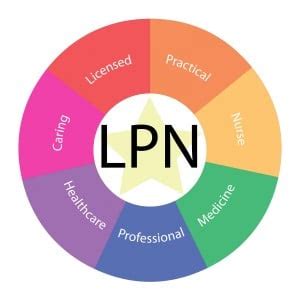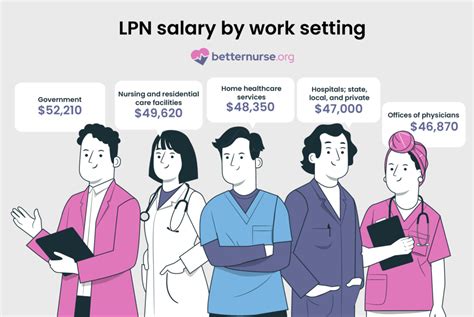Intro
Unlock the requirements and skills needed to succeed as a Licensed Practical Nurse (LPN). Discover the essential qualifications, education, and training necessary for a career in LPN nursing. Learn about the key skills, certifications, and experience required to excel in this in-demand healthcare role and start your LPN career path today.
Licensed Practical Nurses (LPNs) play a vital role in the healthcare system, providing essential care to patients in various settings. As the demand for LPNs continues to grow, it's essential to understand the job requirements and skills needed to succeed in this profession.
LPNs work under the supervision of registered nurses (RNs) and physicians, taking on a range of responsibilities to ensure the well-being of patients. From administering medications to monitoring vital signs, LPNs are instrumental in providing high-quality patient care. But what does it take to become a successful LPN?

Education and Training Requirements
To become an LPN, you'll need to complete a state-approved practical nursing program, which typically takes one year to complete. These programs are offered at vocational schools, community colleges, and universities, and combine classroom instruction with hands-on training in a clinical setting.
Some of the topics you'll study in an LPN program include:
- Anatomy and physiology
- Pharmacology
- Nursing skills
- Patient assessment
- Medical terminology
After completing your program, you'll be eligible to take the National Council Licensure Examination (NCLEX-PN) to become licensed. Requirements for licensure vary by state, so be sure to check with your state's nursing board for specific requirements.
Key Skills Needed to Succeed as an LPN
While education and training are essential, there are several key skills that can help you succeed as an LPN:
- Communication skills: Effective communication is critical in healthcare, where you'll need to work with patients, families, and healthcare teams to provide high-quality care.
- Compassion and empathy: LPNs work with patients who may be experiencing stress, anxiety, or pain, so it's essential to be able to provide emotional support and empathy.
- Attention to detail: LPNs are responsible for administering medications, monitoring vital signs, and performing other tasks that require attention to detail.
- Organizational skills: LPNs often work in fast-paced environments, where they need to prioritize tasks and manage their time effectively.
- Physical stamina: LPNs may be required to lift patients, stand for long periods, or work in physically demanding environments.
Work Environment and Job Responsibilities
LPNs work in a variety of settings, including hospitals, nursing homes, clinics, and home healthcare agencies. Some common job responsibilities include:
- Administering medications: LPNs are responsible for administering medications to patients, monitoring their effects, and reporting any adverse reactions.
- Monitoring vital signs: LPNs take patients' vital signs, such as temperature, pulse, and blood pressure, and report any changes to the healthcare team.
- Providing wound care: LPNs may be responsible for dressing wounds, applying topical treatments, and monitoring wound healing.
- Assisting with medical procedures: LPNs may assist with medical procedures, such as inserting catheters or taking X-rays.

Specialized Roles for LPNs
While LPNs can work in a variety of settings, some may choose to specialize in specific areas, such as:
- Pediatric nursing: LPNs who specialize in pediatric nursing work with children and adolescents, providing care and support in hospitals, clinics, and home healthcare settings.
- Gerontological nursing: LPNs who specialize in gerontological nursing work with older adults, providing care and support in nursing homes, assisted living facilities, and home healthcare settings.
- Occupational health nursing: LPNs who specialize in occupational health nursing work with employees and employers, providing care and support in workplace settings.
Salary and Job Outlook
According to the Bureau of Labor Statistics (BLS), the median annual salary for LPNs was $47,480 in May 2020. However, salaries can vary depending on location, experience, and setting.
The BLS also reports that employment of LPNs is projected to grow 11% from 2020 to 2030, faster than the average for all occupations. This growth is driven by an increasing demand for healthcare services, particularly in long-term care settings.

Conclusion
Licensed Practical Nurses play a vital role in the healthcare system, providing essential care to patients in various settings. To succeed as an LPN, you'll need to complete a state-approved practical nursing program, pass the NCLEX-PN exam, and possess key skills such as communication, compassion, and attention to detail. With a strong job outlook and opportunities for specialization, a career as an LPN can be a rewarding and challenging choice for those who are passionate about healthcare.
We hope this article has provided you with a comprehensive overview of the job requirements and skills needed to succeed as an LPN. If you have any questions or comments, please feel free to share them below.
What is the difference between an LPN and an RN?
+LPNs and RNs are both nursing professionals, but they have different levels of education and training. LPNs typically complete a one-year program and work under the supervision of RNs, while RNs complete a two-year or four-year program and can work independently.
Can LPNs work in any state?
+LPNs must be licensed in the state where they wish to work. Requirements for licensure vary by state, so it's essential to check with the state's nursing board for specific requirements.
What is the job outlook for LPNs?
+The job outlook for LPNs is positive, with employment projected to grow 11% from 2020 to 2030, faster than the average for all occupations.
